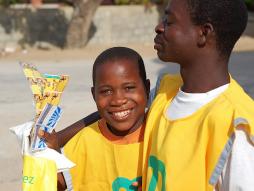Editor's Note: This guest post is by Janet Gunter, a anthropologist and blogger, an ex-“aid worker” interested in communication, technology, and new economies. She is currently working as an adviser at @Verdade newspaper in Maputo, Mozambique.
Mobile money arrived in Mozambique earlier this year, after the larger of the two mobile operators, the state-owned mcel, rolled out a service called mKesh (close in pronunciation to mCash). mKesh “soft launched” the service in 2009, but has intensified its efforts this year, with an official launch in September. The service now claims to have 41,000 registered customers and 2,700 agents across the country.
So far, however, the story of mobile money in Mozambique is a cautionary tale which provides clues about the adaptability of the lauded operator-led model.
Like with mPesa, Kenya’s Safaricom-led service, mcel’s 4 million plus subscribers can use the service, creating a “mobile wallet” which is designed to be used to collect cash from participating agents and make payments.

